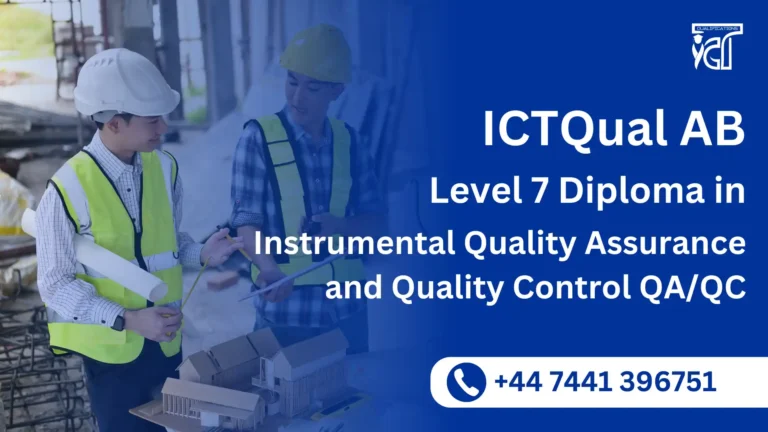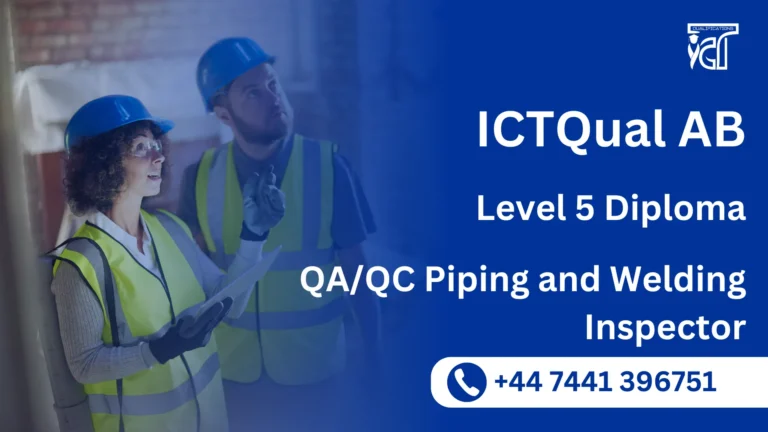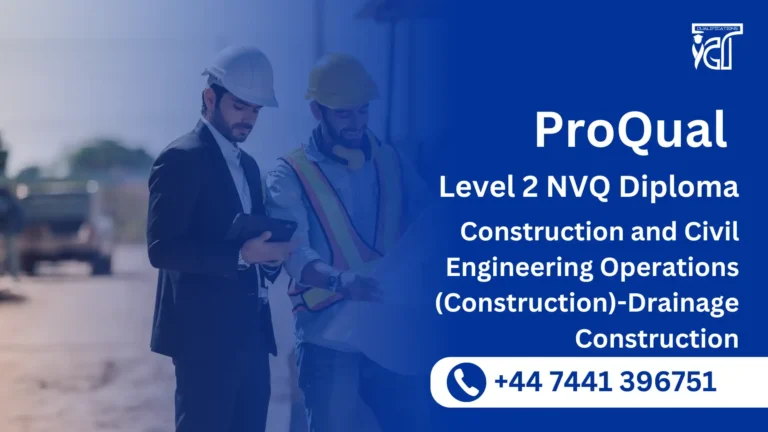The ProQual Level 5 NVQ Diploma in Controlling Lifting Operations (Construction) – Planning Lifts is a highly regarded, Ofqual-regulated qualification designed to equip professionals with the skills and knowledge necessary to plan, manage, and oversee lifting operations in the construction industry. This qualification is ideal for individuals working in or aspiring to work in lifting operation management roles, ensuring safety and efficiency in complex construction projects.
The ProQual Level 5 NVQ Diploma is an advanced vocational qualification tailored to individuals in senior roles within the construction sector. Specifically focusing on lifting operations, it provides a structured learning path to ensure candidates possess the necessary expertise to manage the planning, coordination, and execution of lifting operations safely and effectively.
This assignment-based qualification allows learners to complete coursework at their own pace while applying their skills in real-world settings. The focus is on practical experience, ensuring that you are not just learning theory but also gaining the hands-on expertise needed to excel in this field.
Choosing the ProQual Level 5 NVQ Diploma in Controlling Lifting Operations (Construction) – Planning Lifts offers a range of advantages for both individuals and employers. The qualification ensures that those involved in lifting operations possess the essential skills to carry out their duties safely, efficiently, and in compliance with industry standards. Moreover, the flexibility of assignment-based learning makes it easier for professionals to gain the qualification without interrupting their work schedule.
The ProQual Level 5 NVQ Diploma in Controlling Lifting Operations (Construction) – Planning Lifts is a highly valuable qualification for those seeking to enhance their careers in the construction industry. With its focus on safety, efficiency, and practical experience, this qualification equips learners with the skills needed to manage lifting operations and plan complex lifts with confidence. By choosing this Ofqual-regulated, assignment-based qualification, you are positioning yourself for success in one of the most dynamic sectors of the construction industry.
ProQual Level 5 NVQ Diploma in Controlling Lifting Operations (Construction) – Planning Lifts
The ProQual Level 5 NVQ Diploma in Controlling Lifting Operations (Construction) – Planning Lifts, to achieve the qualification candidates must complete ALL of the Mandatory units.
| Sr# | Unit Title | Unit Level | GLH |
|---|---|---|---|
| 1 | Developing and maintaining good working relationships in the workplace | 3 | 27 |
| 2 | Planning lifting activities in the workplace | 5 | 120 |
| 3 | Planning and establishing safety, health, welfare and environmental systems for lifting operations in the workplace | 5 | 110 |
| 4 | Planning work activities and resources to meet project requirements in the workplace | 4 | 50 |
| 5 | Evaluating and confirming work methods in the workplace | 7 | 30 |
| 6 | Planning the preparation of the site for the project in the workplace | 7 | 50 |
| 7 | Identifying, allocating and planning the deployment and use of plant, equipment or machinery in the workplace | 6 | 20 |
GLH (Guided Learning Hours) and TQT (Total Qualification Time) are terms commonly used in vocational qualifications to help define the amount of time a learner is expected to spend on their studies.
1. GLH (Guided Learning Hours)
GLH refers to the number of hours a learner spends being directly taught, supervised, or supported during their course. This includes the time spent in activities such as:
- Classroom instruction
- Practical workshops
- One-on-one tutoring or mentoring sessions
- Online learning sessions with tutor support
In other words, GLH represents the time that learners are actively engaged with their instructors or learning activities.
2. TQT (Total Qualification Time)
TQT represents the total amount of time a learner is expected to invest in completing a qualification, including:
- GLH (Guided Learning Hours): Time spent on direct learning, as explained above.
- Self-Directed Learning: This includes time spent on independent study, research, assignment completion, preparation for exams, and any other work the learner does outside of direct teaching hours.
TQT is a broader measure that includes all the time required to achieve the qualification. It helps learners and employers understand the overall commitment required for the qualification.
Key Differences Between GLH and TQT:
- GLH focuses on direct learning with guidance or supervision.
- TQT includes GLH as well as independent study time and other learning-related activities.
Example:
If a qualification has a TQT of 600 hours and a GLH of 250 hours, it means the learner should spend 250 hours in direct learning (classroom, online, or tutor-led sessions) and 350 hours on independent study or research.
ProQual Level 5 NVQ Diploma in Controlling Lifting Operations (Construction) – Planning Lifts
Developing and maintaining good occupational working relationships in the workplace
- Develop, maintain and encourage working relationships to promote good will and trust.
- Inform relevant people about work activities in an appropriate level of detail, with the appropriate level of urgency.
- Offer advice and help to relevant people about work activities and encourage questions/requests for clarification and comments.
- Clarify proposals with relevant people and discuss alternative suggestions.
- Resolve differences of opinion in ways that minimise offence and maintain goodwill, trust and respect.
Planning lifting activities in the workplace
- Confirm work requirements from information when planning lifting activities using lifting equipment.
- dentify and review influencing factors and guidance material about the work environment and resources.
- Establish methods of work by arranging, planning, assessing and accounting for all influencing factors.
- Amend work methods to take account of changing circumstances whilst maintaining requirements of the lifting activity.
- Communicate work methods to people involved in the lifting activity.
- Prepare and record lift plans, work methods and schedules and negotiate and agree them with decision makers.
- Apply a range of engineering-based calculations to inform planning.
Planning and establishing safety, health, welfare and environmental systems for lifting operations in the workplace
- Identify and recommend actions for improving the safety, health, and welfare of people affected by the lifting operation.
- Promote a culture of safety, health, welfare and environmental awareness.
- Establish procedures that ensure lifting team responsibilities and competencies are fully applied to the lifting operation.
- Ensure the safety, health, welfare and environmental protection equipment and resources comply with current legislation
- Establish and implement risk assessments and method statements and lessons learned to prevent recurrence.
- Review safety, health, welfare and environmental protection systems on completed lifting activities in accordance with organisational and statutory requirements.
- Assess the significance of environmental factors as they affect the lifting operation and take appropriate action.
Planning work activities and resources to meet project requirements in the workplace
- Organise work activities to make the most efficient use of the available resources.
- Recommend alternative methods, resources and systems to meet programmes and schedules.
- Obtain clarification or advice from various sources where the resources required are not available.
- Examine work activities against project data or operational data and the requirements of external factors.
- Update existing programmes and schedules of planned activities and inform stakeholders.
- Implement systems to monitor and record works against programmes and schedules.
Evaluating and confirming work methods in the workplace
- Evaluate project or operational data in order to identify work methods
- Obtain additional information from other sources in cases where the available project data is insufficient.
- Identify work methods which will make the best use of resources and materials and meets project and current organisational requirements.
- Evaluate identified work methods against technical, environmental and project criteria and select appropriate methods.
- Ensure method statements and risk assessments are current, accurate, agreed and acceptable to all stakeholders.
- Recommend and promote the selected work method for the project.
Planning the preparation of the site for the project in the workplace
- Assemble and review information used in the preparation of the project plan, clarify information which is not clear and update it for production planning purposes.
- Identify factors for consideration, record them and distribute them to people who may be affected.
- Plan for traffic management, identifying access and egress points for the site and works which are safe, convenient and which minimise disruption.
- Organise the resources required for the preparation of site operations.
- Give accurate details about the proposed work to the utility and emergency services.
- Make arrangements for adequate site safety and welfare, reviewing as work progresses.
- Implement procedures and arrangements for environmental protection and security.
- Implement and record the procedures and arrangements for temporary works.
- Plan the site or area layout for operational purposes and pass information about the plans to the people on the site.
- Ensure notices to people, which provide information and comply with current organisational requirements.
- Ensure the notices are placed correctly and implement a maintenance schedule.
Identifying, allocating and planning the deployment and use of plant, equipment or machinery in the workplace
- Ensure that the specification of the selected plant, equipment or machinery meets the needs of the project before deployment.
- Confirm that the plant, equipment or machinery to be deployed complies with current legislation and will be set up, operated and maintained by competent people.
- Implement a system to update the deployment and allocation of plant, equipment or machinery, and operators, as the project progresses, or changes occur.
- Identify hazards, assess and mitigate risks arising from the use of plant, equipment or machinery and implement measures that protect people and the environment.
- Ensure that plant, equipment or machinery operations are planned, appropriately supervised and conducted in accordance with current legislation.
- Ensure the suitable storage, servicing and maintenance of plant, equipment or machinery has been arranged to meet organisational requirements.
- Identify and record the competency requirements for supervisors, operators and users of plant, equipment or machinery.
- Promote and record opportunities to suggest improvements in plant operations.
- Ensure that plant, equipment or machinery which is no longer needed is returned or removed and records are maintained.
Benefits of the ProQual Level 5 NVQ Diploma in Controlling Lifting Operations (Construction) – Planning Lifts
- Enhanced Career Opportunities
The ProQual Level 5 NVQ Diploma is a highly recognized qualification in the construction industry. It opens up opportunities for career advancement, particularly for individuals aiming for higher-level roles in lifting operations management, site management, and health and safety supervision. - Increased Earning Potential
Holding a Level 5 qualification demonstrates advanced expertise in lifting operations, which can lead to higher-paying positions within the construction industry. Employers often seek qualified professionals for senior roles, offering better financial compensation. - Specialized Knowledge and Expertise
This qualification provides in-depth knowledge of lifting operations, including planning, risk assessment, safety measures, and operational efficiency. You will gain specialized skills to oversee complex lifting tasks and ensure compliance with industry standards, which are highly valued in the industry. - Improved Safety and Risk Management Skills
A core benefit of this qualification is the emphasis on health and safety regulations. The course equips you with the necessary tools to identify potential risks, plan lifts safely, and minimize accidents, ensuring a safer work environment for yourself and your team. - Practical, Real-World Application
The assignment-based structure of this qualification allows you to apply your learning to real-world scenarios. This ensures that you are not only absorbing theoretical knowledge but also gaining practical, hands-on experience in planning and managing lifting operations effectively. - Recognition in the Industry
As an Ofqual-regulated qualification, the ProQual Level 5 NVQ Diploma is widely recognized by employers and professional bodies across the UK and internationally. Completing this course boosts your professional credibility and demonstrates your commitment to meeting industry standards. - Flexible, Self-Paced Learning
The course is entirely assignment-based, which means you can complete your qualification at your own pace while continuing to work. This flexibility makes it easier for working professionals to balance their studies with their careers, providing a convenient and efficient route to gaining the qualification. - Leadership and Supervisory Skills Development
The qualification prepares you for leadership roles in lifting operations, helping you develop vital skills in managing teams, overseeing projects, and ensuring compliance with safety regulations. It builds your ability to take charge and lead complex lifting operations on construction sites. - Improved Compliance and Regulatory Knowledge
As lifting operations are subject to stringent regulations, this qualification ensures that you stay up to date with the latest safety laws and standards. You’ll gain a thorough understanding of the legal requirements and best practices, which is crucial for ensuring compliance on-site. - Higher Industry Standards
By completing the ProQual Level 5 NVQ Diploma, you demonstrate a commitment to upholding high standards in lifting operations, safety, and operational efficiency. This is invaluable not only for your career but also for the overall performance of the construction projects you work on. - Portfolio Building
Throughout the qualification, you will create a portfolio of evidence, showcasing your ability to manage real-life lifting operations. This portfolio becomes a tangible proof of your skills and knowledge, helping you stand out to potential employers and clients. - Confidence in Planning Complex Lifts
The course equips you with the skills to confidently plan complex lifting operations, ensuring the safe and effective execution of heavy lifts. With this qualification, you’ll be able to assess risks, select the right equipment, and prepare the site, increasing your overall competency in managing challenging lifting tasks.
The ProQual Level 5 NVQ Diploma in Controlling Lifting Operations (Construction) – Planning Lifts is designed for individuals who are already working in the construction industry, specifically in roles where they are responsible for overseeing and managing lifting operations. The best candidates for this qualification typically possess the following traits and professional backgrounds:
- Experienced Lifting Operations Managers
This course is ideal for those currently in management roles within lifting operations. If you are already responsible for overseeing lifting tasks, managing teams, or ensuring safety standards are met on construction sites, the Level 5 NVQ Diploma will help further develop your expertise in planning and controlling lifting operations. - Construction Site Managers
Construction site managers, who supervise and coordinate various construction activities, including lifting operations, will benefit from the practical, safety-focused content of this qualification. It will enhance your ability to plan and manage lifting operations safely and efficiently on-site. - Health and Safety Professionals
If you are working in health and safety roles within the construction industry and want to specialize in lifting operations, this qualification will provide you with the necessary knowledge to understand the complexities of lifting tasks and the regulatory frameworks governing them. - Supervisors and Team Leaders
If you are a supervisor or team leader responsible for managing lifting operations or coordinating teams involved in lifting tasks, this qualification will give you the skills needed to take on higher-level responsibilities. You’ll be equipped to plan and oversee lifts, ensuring compliance with safety protocols. - Rigging and Lifting Supervisors
Individuals working as rigging or lifting supervisors, who have experience but need a formal qualification, will find this course a perfect fit. It helps to formalize and expand the knowledge of those managing the logistics and safety of lifting equipment, personnel, and operations. - Construction Engineers and Surveyors
Engineers and surveyors who regularly interact with lifting operations on construction sites will benefit from understanding the specific planning and safety considerations involved in lifting tasks. This qualification will support their work in ensuring all aspects of lifting operations are properly planned and executed. - Professionals Seeking Career Advancement
If you’re an experienced professional looking to take the next step in your career, especially into senior lifting operations or site management roles, this qualification will give you the edge. It demonstrates your commitment to professional development and positions you for advanced career opportunities within the construction sector. - Individuals with a Background in Construction Project Management
For those with a background in construction project management but lacking in-depth knowledge of lifting operations, the ProQual Level 5 NVQ Diploma will help you expand your skills to include the critical aspects of planning, managing, and overseeing lifting activities on-site. - Those Looking for an Industry-Recognized Qualification
If you are seeking a qualification that is Ofqual-regulated and widely recognized by employers, this course is the ideal choice. It will enhance your professional credibility and open doors for roles that require expert knowledge in lifting operations.
Entry Requirements
Register Now
Qualification Process
Qualification Process for the ProQual Level 5 NVQ Diploma in Controlling Lifting Operations (Construction) – Planning Lifts
- Self-Assessment:
Begin by evaluating your eligibility to ensure you meet the qualification requirements, including work experience, knowledge, and language proficiency. - Registration:
Complete your registration by submitting the required documents, including a scanned copy of a valid ID, and paying the registration fee. - Induction:
An assessor will conduct an induction to confirm your eligibility for the course and explain the evidence requirements. If you do not meet the criteria, your registration will be canceled, and the fee will be refunded. - Assignmnets & Evidence Submission:
Provide all assignmnets and the necessary evidence based on the assessment criteria outlined in the course. If you are unsure of the required evidence, consult with the assessor for guidance on the type and nature of evidence needed. - Feedback and Revision:
The assessor will review your submitted evidence and provide feedback. Evidence that meets the criteria will be marked as “Criteria Met,” while any gaps will be identified. You will be asked to revise and resubmit if needed. - Competence Evidence:
Submit final evidence demonstrating that all learning outcomes have been met. This evidence will be marked as “Criteria Met” by the assessor once it is satisfactory. - Internal Quality Assurance (IQA):
The Internal Quality Assurance Verifier (IQA) will review your evidence to ensure consistency, quality, and compliance with standards. - External Verification:
The IQA will submit your portfolio to ProQual’s External Quality Assurance Verifiers (EQA) for final confirmation. The EQA may contact you directly to verify the authenticity of your evidence. - Certification:
Upon successful completion of all checks, ProQual will issue your official certificate, confirming that you have attained the ProQual Level 5 NVQ Diploma in Controlling Lifting Operations (Construction) – Planning Lifts.







